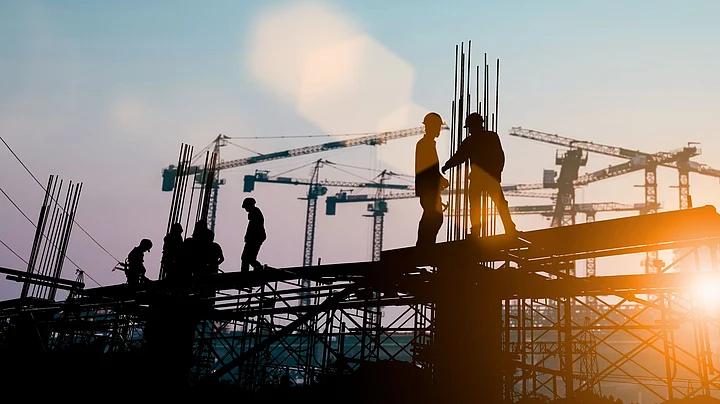The Supreme Court on Monday, 9 December, partially lifted its ban on construction activities in the Delhi-NCR region, allowing them between 6 AM and 6 PM, after the Central Pollution Control Board (CPCB) said that air quality index (AQI) level is not severe at present.
The apex court, which had on 4 November stopped construction and demolition in Delhi-national capital region (NCR), perused the affidavit filed by CPCB which said however that no construction should be permitted during 6 PM to 6 AM.
CPCB’s GRAP Mandates ‘Strict’ Pollution Control
The CPCB said the ban could be partially lifted by allowing these activities during the day time subject to criteria stipulated in Graded Response Action Plan (GRAP) which mandates strict enforcement of rules for dust control at construction activities and closure of non-compliant sites during moderate to poor AQI category days.
“Presently, the situation not being severe, CPCB is of considered opinion that partial ban could be in place for construction activities in as much as no construction should be permitted during night time (6 PM to 6 AM),” said the affidavit, which was perused by a bench of Justices Arun Mishra and Deepak Gupta.
“The ban imposed could be partially lifted by permitting activities during day time (6 AM to 6 PM), subject to the criteria stipulated in GRAP wherein strict enforcement of rules for dust control in construction activities and closure of non-compliant sites is mandated in moderate to poor AQI category and further a ban on construction activities may be imposed by EPCA is ambient air quality levels persist in severe plus/ emergency category for 48 hours or more,” it said.
High-Level Committee to Examine Feasible Solutions
Additional Solicitor General (ASG) A N S Nadkarni told the bench that in pursuance of the court’s 25 November order, the Centre has constituted a high-level committee, in which IIT experts are also associated, to examine the feasibility of using technology like smog towers to combat air pollution.
Nadkarni said the committee has already held a meeting and is scheduled to meet next on 11 December.
“What about the use of technology? When will it be implemented?” the bench asked.
The ASG said that after holding meeting, the committee would give its report to the Ministry of Environment, Forest and Climate Change (MoEF&CC).
“When should we be getting the report on smog towers? By Friday?” the bench asked.
The ASG said he would file it by 13 December.
The bench said that secretaries for environment of Delhi, Uttar Pradesh, Haryana and Punjab should also be associated with the high-level committee so that they could sit together and come out with feasible solution on the issue.
On stubble burning, the bench asked the governments of Uttar Pradesh, Punjab and Haryana to furnish before it the updated report up to 11 December.
The court said it would hear the pollution matter on 16 December.
Regarding de-congestion at metro stations in Delhi, senior advocate Aparajita Singh, assisting the court as an amicus curiae in the pollution matter, said though Delhi Metro Rail Corporation (DMRC) has said they would de-congest the stations, it not submitted a plan for this.
The bench asked the DMRC to place before the court the plan on how it proposes to de-congest traffic at metro stations.
In its affidavit filed in the apex court, the CPCB has said that Environment Pollution Control Authority has been entrusted with the responsibility of implementation of GRAP and suggest additional steps that may be required.
CPCB’s Affidavit Ensures Implementation of GRAP
The affidavit said that “under GRAP, construction activities are stopped if air quality levels reaches severe plus or emergency category i.e when ambient PM2.5 or PM10 concentration value reach 300 micrograms per cubic metre or 500 micrograms per cubic metre respectively and persists for 48 hours or more.”
It said air quality was in severe category since 5 PM onwards on 29 October, 2019 in Delhi-NCR and accordingly task force on GRAP during its meeting held on 30 October, 2019 recommended that construction activities like earthwork which have potential to generate dust, hot mix plants and stone crushers should not be operated between 6 PM to 10 AM till 2 November in Delhi, Gurugram, Faridabad, Noida, Greater Noida, Ghaziabad, Sonepat and Bahadurgarh.
It said air pollution level reached severe plus during night on 31 October, 2019 and task force on GRAP, during its meeting held on 1 November, recommended that construction activities, hot mix plants and stone crushers shall now remain closed till 5 November.
“It is respectfully submitted that daily average PM2.5 and PM 10 concentrations have considerably decreased from 364 micrograms per cubic metre and 499 micrograms per cubic metre on 15 November respectively to 193 micrograms per cubic metre and 323 micrograms per cubic metre on 4 December in Delhi. Similar reduction in particulate matter levels was also observed in NCR towns,” it said.
